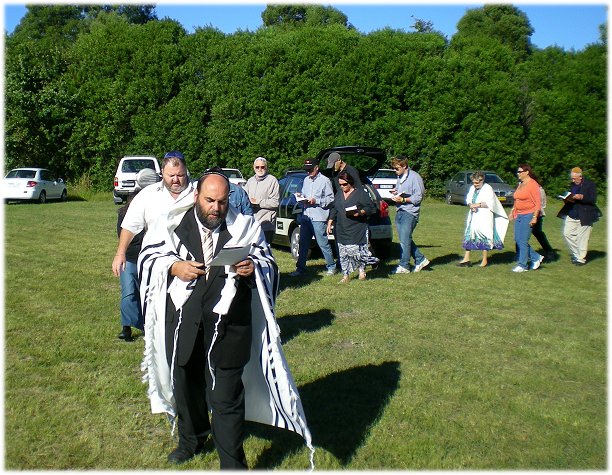|
PLETTENBERG BAY JEWISH CEMETERY CONSECRATED – 6 APRIL 2008
Plettenberg Bay is home to one of the country’s fastest
growing Jewish communities, and in terms of numbers it
already has a significantly larger Jewish presence than some
of the major urban centres, such as Bloemfontein and East
London. Regular Friday night services, and occasional
Shabbat morning, Yom Tov and (when minyanim are convened for
yahrtzeit purposes) weekday services are held. Aside from
this, the community has been relatively inactive in recent
years, but this is hopefully changing for the better. Last
month, a large proportion of the community turned out to
participate in the consecration of the new Jewish cemetery,
the first in the town’s history.
Rabbi Moshe Silberhaft, Spiritual Leader to the Country Communities, officiated at the consecration service. In his address, he praised the community for going to the lengths it did to secure the ground for the cemetery, something that had not been an easy undertaking. It is over the holiday period that Judaism in Plettenberg Bay, in common with other Southern Cape centres like George, really comes to life. During these weeks, scores of holidaymakers from Johannesburg and Cape Town, many of whom have permanent holiday homes in the area, descend on the town. Much of the funding for Plettenberg Bay’s shul, mikveh and hall has come from this source. For Rabbi Silberhaft, the input of out-of-towners has, in some ways, been a mixed blessing. While he welcomed the fact that for a few weeks at the end of each year, there was a dramatic upsurge in Yiddishkeit in Plettenberg Bay, the general lack of involvement of the local community in these activities meant that the continuity could not be maintained once the holidaymakers left. “Visitors should not treat Plettenberg Bay only as a holiday venue, but rather should work together with the local residents as one community in pursuing Jewish activities. This will help infuse the local Jewish community with the kind of enthusiasm and commitment to making things happen that can be carried over into the new year” he said. Rabbi Silberhaft pointed to George as an excellent example of how out-of-towners and locals had long been working well together for their mutual benefit. For example, the former ran learning programmes between Mincha and Maariv and invited local residents to Shabbat meals. Initiatives like the establishment of a Southern Cape Jewish Council encompassing Plettenberg Bay, George, Oudsthoorn, Knysna and other centres where there was a Jewish presence was evidence of the growing strength of Jewish communal life in the region. He believed that the strong and vibrant Jewish communities elsewhere in the country had much to offer in helping those smaller communities to better establish themselves. |
